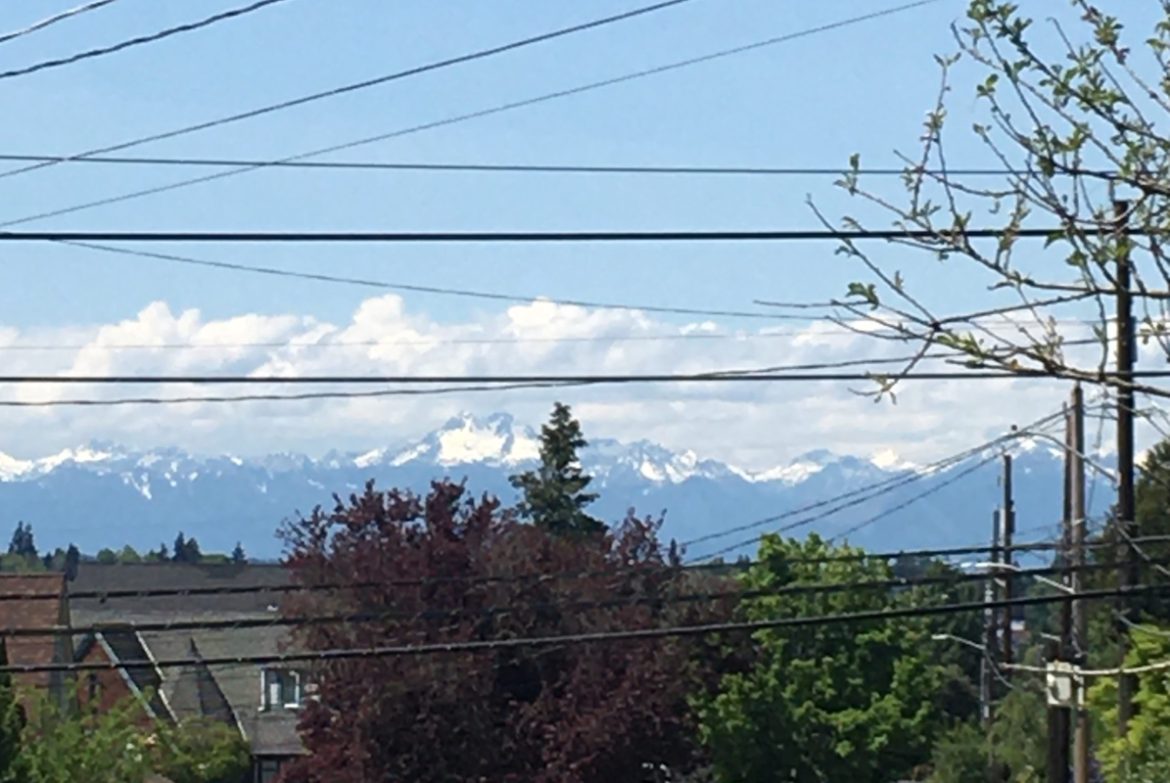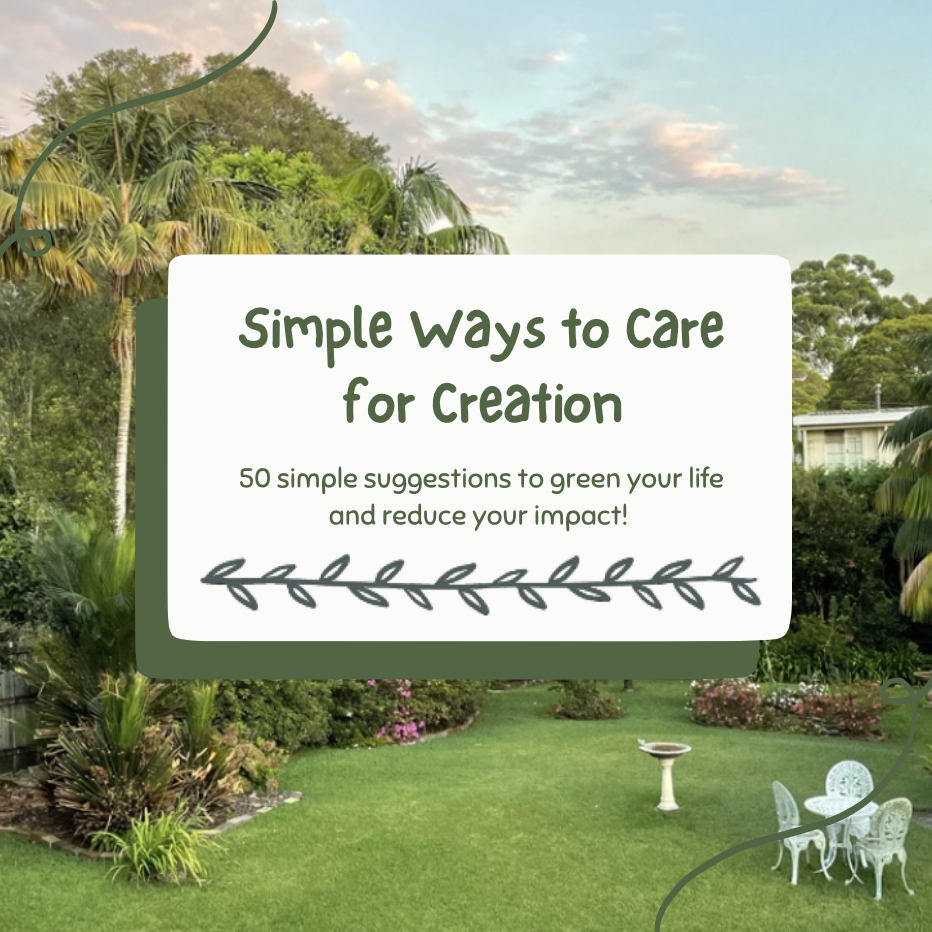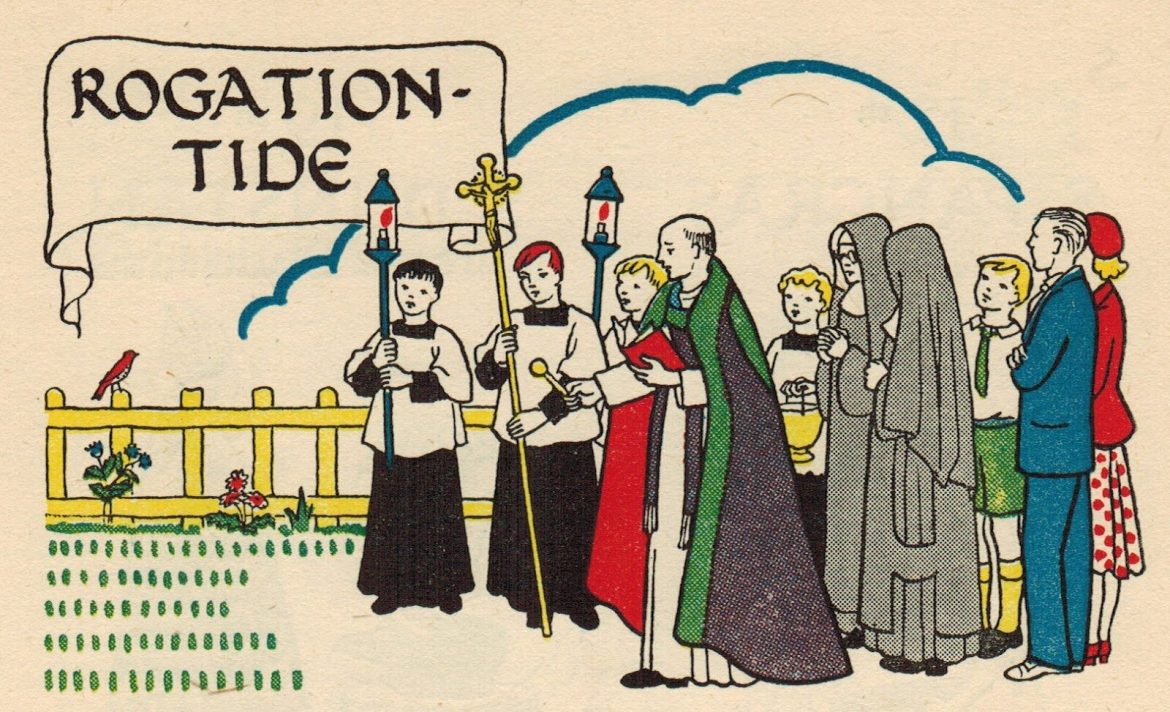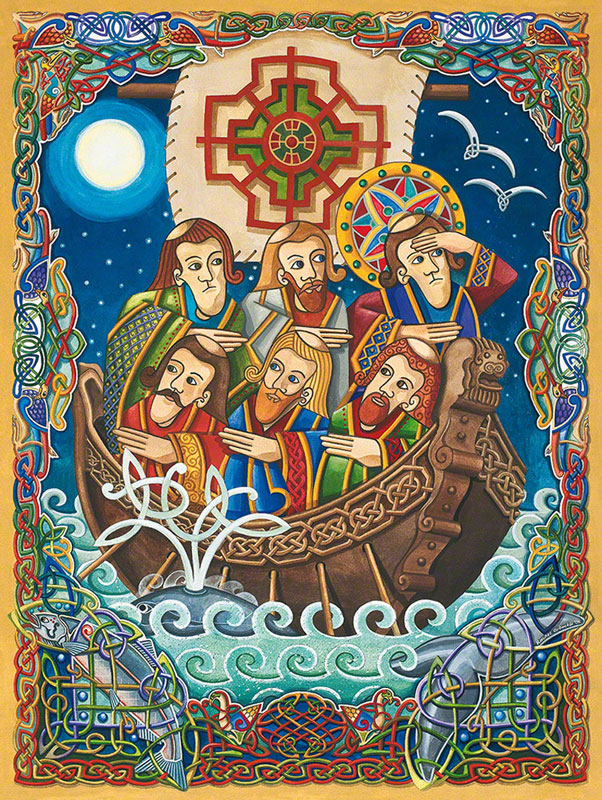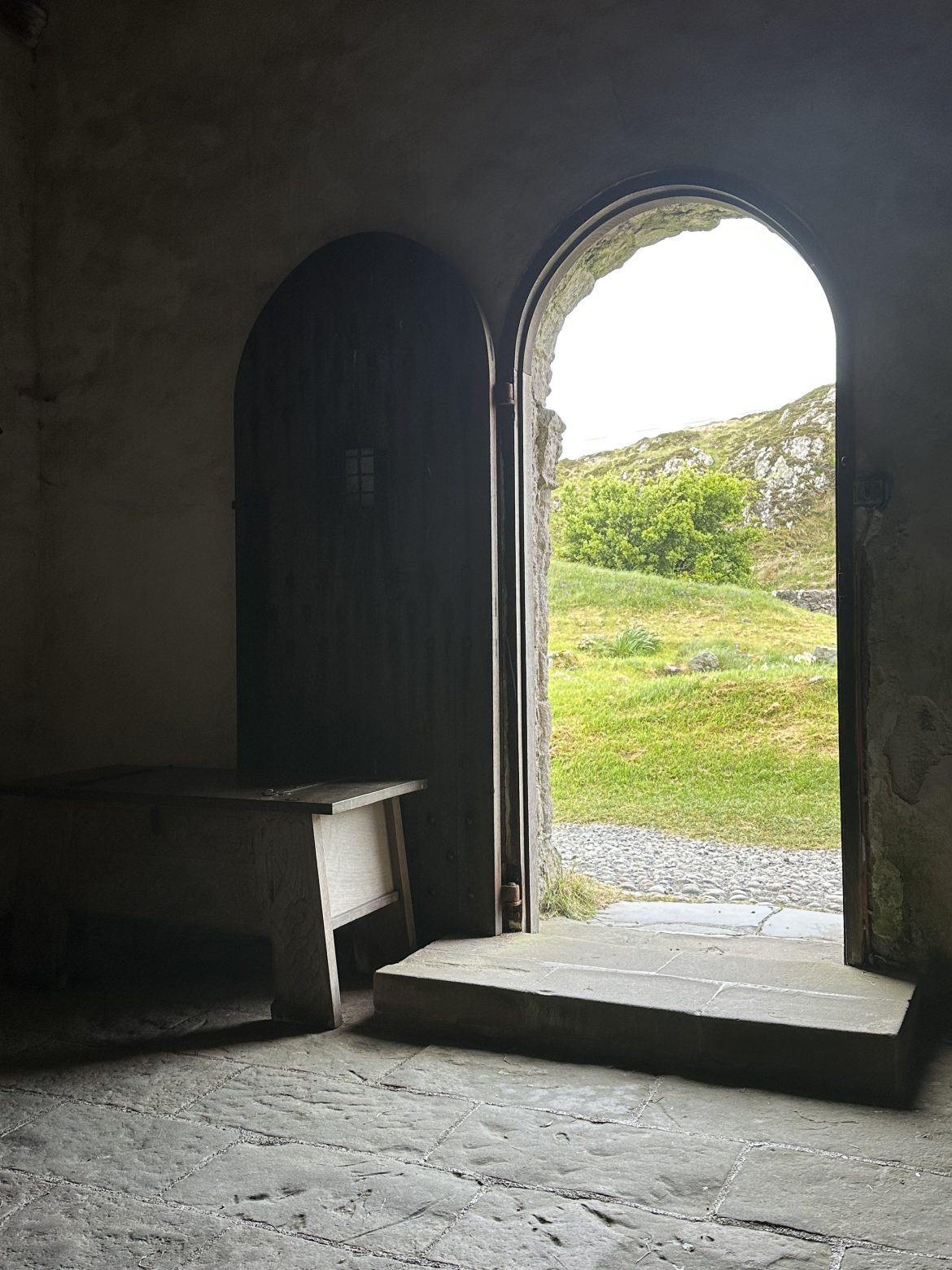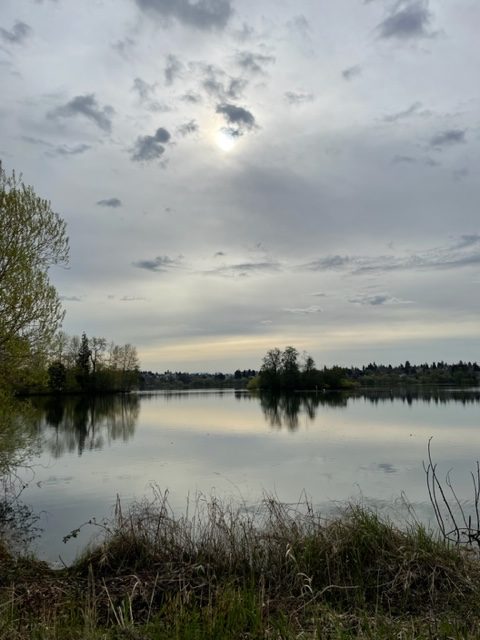by Christine Sine
Welcome to St Brendan’s Day. He is one of my favourite Celtic saints. Perhaps it is because I spent 12 years of my life living on a ship. Or maybe I just love adventurers. Whatever the reason, I find him inspiring and it is not just his incredible journey. His beautiful prayer, which seems to express his philosophy of life also contributes to that. Here are the first few lines:
Help me to journey beyond the familiar
and into the unknown.
Give me the faith to leave old ways
and break fresh ground with You.
This last week has been another intense garden week for me, motivated by the record breaking temperatures we needed to plan for this weekend. It is a tremendous joy to watch the flowers bloom and the seedlings sprout and grow. Getting my hands in the dirt rejuvenates my soul. Photography is another creative art that inspires and refreshes me. I particularly love using the photos I take as a focus for reflection and this last week I contributed two posts with such reflections. My Meditation Monday: When the Wires Get in the Way, Learn From Them is a reflection on the distracting and sometimes ugly cables and wires that sometimes destroy the beauty of a photo. On Thursday I contributed Still Waters: Reflections in the Lake a short reflection and prayer that it gave birth to.
Lilly Lewin’s Freerange Friday: Poems from a Thinplace comes to us from the island of Iona where she is at present. This is a place of refreshment, inspiration and sacredness for her as it is also for myself. I love her poem and the invitation to “Cross the threshold into a thin place.” We all need thin places in our lives. Place of quiet and renewal that refresh our souls.
One thing I love about our Godspace authors is that they constantly teach me new things. This week David Pott and Catherine Knights wrote about Rogation Sunday. Their post Reviving Rogationtide is a fascinating read not only of information but also of interesting practices to combine with the celebration.
This week we celebrate Ascension Day. This is not a celebration I grew up with but every year I enjoy learning more and adding to our resource list. This year I learned that in Sweden people go into the woods very early in the morning to hear the birds at sunrise. It is said to be good luck if a cuckoo is heard from the east or west. In Indonesia, in spite of the fact that 80% of the population are Muslim, Ascension Day is a public holiday, a day to go to church for Christians, a day to rest and enjoy life for Muslims. I love that this is a day not just to celebrate Jesus ascent into heaven but also celebrate the new creation that his ascent brought into being. I love to focus on this aspect which seems particularly important for those of us who are concerned about sustainability and preservation of God’s good creation.
This season between Easter and Pentecost is full of celebrations that we are encouraged to give attention to. Pentecost itself is not far away. It falls on May 28th this year and we have just updated our resource list. We work hard to provide resources from many different countries so if you have resources you would like to add please let us know.
Many blessings on you this week.
I sit,
Encircled by God’s love,
Embraced by God’s presence,
Filled with God’s light.
I sit,
Savouring the wonder,
We are made from the soil,
Your filled with divine life.
I sit,
Filled with awe.
God is everywhere
God is within me.
(c) Christine Sine 2023
by June Friesen
The International Day of Families was established by the United Nations in 1993 as a way to raise awareness of issues faced by families throughout the world and highlight the important role that families hold in communities.
I was intrigued as I read the history behind the establishment of this day. The idea was to highlight the importance of the family system, how it has changed over the years, and the differences that there are in cultures throughout the world. During my lifetime I have seen many changes in the family systems and cultures. Above you will see three generations. I am the child and the year is about 1953. Both of my grandmothers and my mother are pictured here. These three women taught me many things as I grew up. My one grandmother was a great seamstress and she created blankets as well as aprons out of scraps of material she had left after sewing dresses, skirts and blouses. My other grandmother was a great baker and I was blessed that she allowed me to put sprinkles on cookies and help her bake. My mother taught me so much – indeed I was able to be the homemaker, wife and mother I am because of the many things I learned from her example as well as my grandmothers. It is interesting that I have many memories of extended family at large gatherings and often it included aunts and uncles of both sides of my family. These gatherings were possible as there was not the easy mobility of society to pick up and move as there is in today’s world. As we have moved forward in time we find that not only are families separated by distance on the North American continent but all over the world, so I can readily see the importance of establishing this special day. In the Scriptures we also see how God felt that family was important from the beginning. When He created humanity He created male and female and then encouraged them to reproduce.
Genesis 1:27-28: God created human beings; he created them godlike, reflecting God’s nature. He created them male and female.
God blessed them:
“Prosper! Reproduce! Fill Earth! Take charge!
Be responsible for fish in the sea and birds in the air, for every living thing that moves on the face of Earth.”
God not only created humanity, but He gave humanity more knowledge and greater ability to be able to think and learn. I am not sure if you have ever pondered the immense difference that there is between humanity and all of the other animal kingdom. He also put humanity in charge of His entire creation – Wow!
As we read and study the Scriptures we see how important family was throughout the Old Testament as well as the New Testament. I also like how when God chose to send Jesus His Son to this earth to improve the relationship between God and humanity, He chose a human family to be the earthly parents of His Son.
Luke 2:1-12: So Joseph went from the Galilean town of Nazareth up to Bethlehem in Judah, David’s town, for the census. As a descendant of David, he had to go there. He went with Mary, his fiancée, who was pregnant. 6-7 While they were there, the time came for her to give birth. She gave birth to a son, her firstborn. She wrapped him in a blanket and laid him in a manger, because there was no room in the hostel. 8-12 There were shepherds camping in the neighborhood. They had set night watches over their sheep. Suddenly, God’s angel stood among them and God’s glory blazed around them. They were terrified. The angel said, “Don’t be afraid. I’m here to announce a great and joyful event that is meant for everybody, worldwide: A Savior has just been born in David’s town, a Savior who is Messiah and Master.
Yes, Jesus was raised in a family where there were other children as well. I believe this is an affirmation to humanity about how important family is to God. There is not a lot mentioned about Jesus and His family but we do know he spent time with His earthly father learning the trade of his father. We also know that they traveled to the Passover celebration at least once as a family. I suspect that they went more than just that one time. We do not hear too much of time spent with His earthly family after he entered His time of ministry however we do know that His earthly mother Mary was present at some of the events, including at His crucifixion.
So how may we as people today celebrate family? Celebrate extended family? Celebrate God’s family in the Church? Celebrate integrated family? Celebrate other family cultures?
As I mentioned I grew up with many extended family gatherings. I learned the importance of having family connections and communication although I also saw the difficulties that resulted from decisions some made about where they moved and lived. I myself was one who moved away from my home and home state when I got married.
Let me share a bit of my own life after I became an adult. When I was married I moved 2,000 miles away from my immediate family. For the first couple of years we lived in close proximity to my husband’s family. This allowed us to develop extended family relationships with his family. Then we made our first big move as a young family as my husband began his career in ministry. We were over 2,000 miles from both of our immediate families so we began to build close friendships in the community/communities where we were living. We did our best to keep family ties with parents/grandparents but as our children became adults and moved away that became more difficult. We also have collected many people around us over the years who are like family – many of them from other places/countries as well as some who are native Arizonans.
Today I would like to challenge us to maybe think outside the usual when it comes to building stronger family relationships. I will share a couple of ideas that my husband and I have incorporated into our lives.
First of all, our two granddaughters live 2,000 miles away from us. How does one build and celebrate family? There are visits back and forth but with job responsibilities those are limited. We have worked hard to make some special memories. One year we rented a cabin in a big park for 5 days. The girls were about four and six – they still talk of that trip and would love to go back. Another time we spent several days in the Grand Canyon and northern Arizona – another thing they would love to do again. But then there was covid and no traveling. So, I began to mail packages of fun things to make, to do, fun treats – they never knew what to expect. Sometimes there were special instructions as to how to open them – like the time I opened a package of little bouncy balls – and scattered them in the package. Open package and dump out – not sure who had more fun, the parents or the girls as balls rolled all over the floor. The girls are now teenagers but we still have some special times we create when we can make memories for all of us.
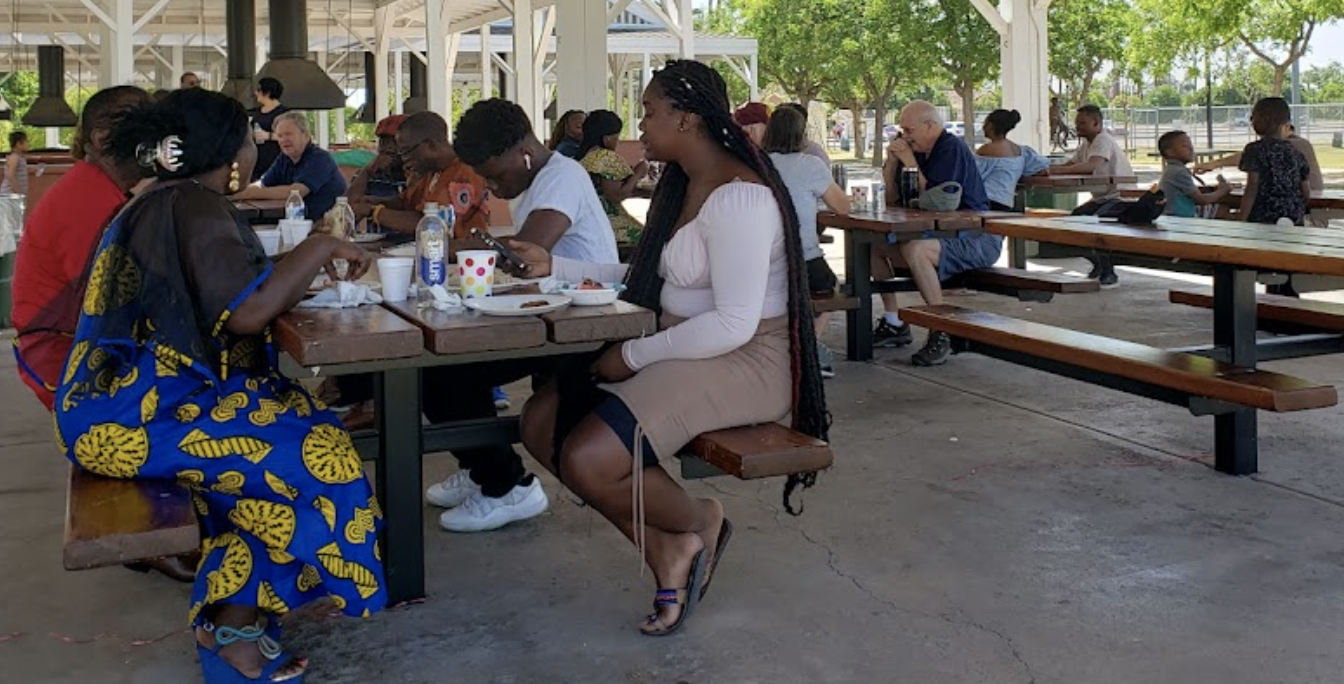
Here is another example of family for us. It is our present church family. While our meeting in person was interrupted by Covid we now meet every month in the park for a time of fellowship and encouragement. If you would ask any of the people, refugees as well as people who have lived here all their lives, we are family. We also try to make it a time to make memories as new people come and join us from time to time as well as we try to have toys for the children – bubbles are a fun thing that they all enjoy. On the other Sundays we enjoy meeting via zoom.
I have shared some thoughts, experiences and ideas you may want to consider in your own family and family celebration. But in our world today I just want to say – celebrating family no matter where you live can be an exciting and worthwhile experience. One more idea is doing cultural exchange – visiting and/or staying with people of another culture. Yes, it seems a bit scary possibly – but we have hosted people from other countries in our home and it has been a great learning experience. We have also stayed in homes in other countries or with other people groups. Adventures like these help one learn to embrace other cultures as you learn why they do certain things and maybe why they have some of the habits that they have. God has created every one of us – given us different features, colors, personalities etc. Yes, it is International Family Day – do something special as a family – maybe even explore together another culture, try some of their traditional foods.
Scriptures from The Message translation.
At Godspace, environmental issues and creation care are two things we are passionate about.
This document is designed to help you celebrate Earth Day by making a positive impact on the environment. It can be easy to feel overwhelmed by the scale of environmental issues facing our planet, but by taking small, simple steps, we can all make a difference! Click here to download today.
by Christine Sine
I am in the mood for reflecting on the photos I took over the last through weeks. It is a wonderfully reflective and inspiring practice
I took this photo of the sun shining through the clouds from our prayer tower a couple of weeks ago. At first I was really frustrated because I could not get a clear view of it without the interfering cable, telephone and other wires that got in the way. I tried to zoom in but the image became fuzzy and unfocused. I thought of walking to a place where the wires no longer got in the way but I knew that by then the sun would have set.
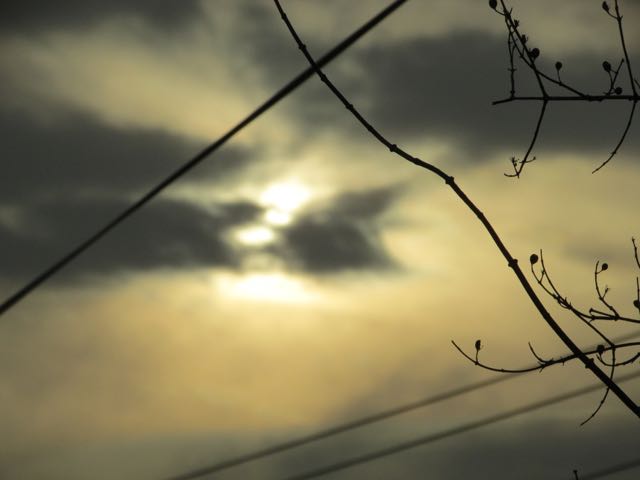
I thought about doctoring the image on photoshop to get rid of the wires, but that seemed like cheating. These wires represent the infrastructure of our society. They carry electricity, and internet. They give us light and connectivity. They are as much a part of our landscape as the sun and the clouds are. They are there, and they are there to stay.
As I reflected on this I wondered: How often is my view of the sun obstructed by the framework of our society? How often is my view of God obscured by the wires – social media, shopping and other distractions as well as the work I give my time to?
Yes I know the clouds obscure the sun too, but, at least on the day I took the photos, the sun still shone through. The clouds added to the beauty of the sky, they did not detract from it. The wires, on the other hand, seemed ugly and out of place.
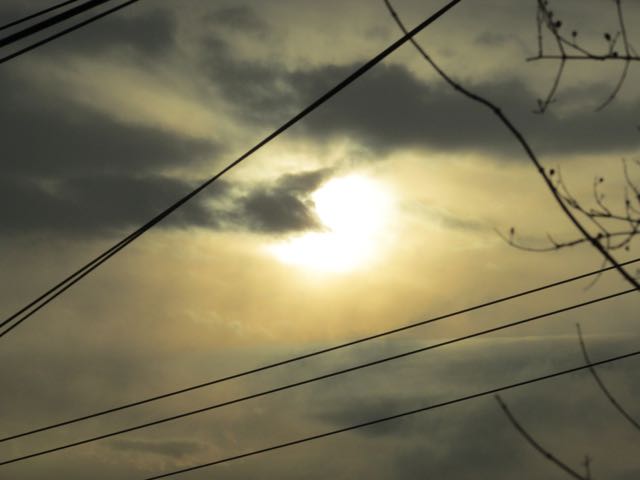
It is only when I pause to gaze on the beauty of God and God’s world that I also become aware of the ugly wires in my life that obscure my image of God. At other times they don’t even register on my consciousness.
This morning as I sit here reflecting on this I would like you to reflect on two questions with me:
What else obstructs my view of God because I don’t take the time to gaze beyond it to the beauty of God?
Where has my image of God become unfocused because I tried to ignore these obstructions?
What could I do to change this?
by Catherine Knights and David Pott
Sunday May 14th is Rogation Sunday. Sixty years ago if you asked people what Rogation Sunday was, many people here in the UK would be able to give an answer, but nowadays few people know about. The origins of Rogationtide are very interesting…
Right back in the 5th century, during the time of Bishop Mamertus of Vienne in Gaul, Vienne suffered a series of natural disasters: there was an earthquake, a fire burned down the town hall, and wild deer made an incursion into the town. In response to these disasters, St. Mamertus ordered the faithful of Vienne to make three successive processions on the Monday, Tuesday, and Wednesday before the feast of the Ascension, in which they were to say sorry for their sins and to ask God for deliverance from their troubles. As they processed, they sang psalms and responses and stopped to pray at various points on their route. And these particular processions became renowned in the Church of the time because of two things: they were highly effective (the natural disasters ceased) and the people of Vienne took them seriously – unlike previous attempts at prayer walking that had been luke-warm, half-hearted supplications for rain or fair weather.
Of course, most people in most years over the centuries that followed didn’t suffer the especially frightening disasters first experienced by the people of Vienne, so they did not feel an urgent need to ask God specifically for an end to earthquakes or beast-incursions. But still, the majority of folk before our modern, industrial era, were well aware of the deadly power of nature and their dependence upon successful harvests, good weather and a balanced amount of rain. So, as time passed, the Rogationtide tradition of saying sorry to God for sin, in order to avert natural disasters and to bring in good harvests, took hold. Indeed, it became a valuable reminder to the faithful of man’s extreme smallness and vulnerability before the powers of nature, not letting them forget that their very lives depended upon God’s forbearance and generosity in doing good. On the Rogation Days, the faithful acknowledged the truth that God is a just judge who holds all of us (and our fruitfulness) in the palm of his hand.
One particularly valuable aspect of Rogationtide processions, right from the beginning, (and it’s the same of all religious processions) was their communal ethos. In them, the faithful moved together as one body, and thus identified themselves, in a very public and conspicuous way, as members of the Christian community. As the community sought to avert God’s anger by its prayers, the faithful gained a powerful sense that they were engaged in an urgent, unified work for the common good. And the visible, purposeful movement of the processing faithful helped to give each individual the courage to acknowledge his own sins – something that’s often easier to do when you’re not doing it on your own.
Over the course of history, the way people practiced Rogationtide changed. Rogation Sundays were associated with “beating the pounds” which meant walking and praying around parish boundaries. Rather than the three days before Ascension, walks started to take place on the Sunday before Ascension Day.
Of course, western cultures of the 1960s, in the light of scientific developments, may have imagined that their heirs would gain ever greater control over nature, and so would have little motivation to pray to God for the aversion of natural disasters. Perhaps that is why churches tended to stop the practice. But we now know that this vision has not come true. Our recent experience of Covid and our knowledge of natural disasters in every corner of the world has taught us that life remains very fragile. Plagues still kill; hurricanes lay waste; droughts parch the land; storms imperil sailors; torrents destroy crops; Covid causes lockdowns. Rogationtide taught the faithful that it is always right, in times good and bad, to turn to God in humble prayer, not only for spiritual graces but also to ask for nature to be kind. The thing is that we are sinners who deserve nothing of God – yet he, who governs all things, is ever merciful.
At Rogationtide, it’s so important for the faithful to be mindful of both the justice and the mercy of God; to remember that Christ is both our judge and our Saviour. Rightly, the Church never talks of the judgement of God without also mentioning His mercy – but it’s also all too easy to marginalise the judgement of God to the point that we forget that we’ve committed real offences and that God’s mercy is not automatic: we do at least need to ask for it, and with some sense of sorrow for what we’ve done wrong. Rogationtide reminds us of this basic truth.
…………………………………..
We live in the town of Bishop Auckland in North East England and we are reviving this excellent practice to bear witness to God together in praise, to acknowledge the ways in which we have let Him down here in Bishop Auckland and to ask for His mercy for our town. This is how we plan to do it…
It’s about 12 miles to walk around Bishop Auckland and the adjacent West Auckland. We are going to meet together at a car park by the River Wear on the north side of town and then split into two groups. Catherine will lead a group clockwise to the east and David will lead the other group anti-clockwise to the west. Both groups will be circulating round and praying at significant sites before we meet about 3 hours later at a farm shop on the south side of the town.

Map

Untitled
Newton Cap viaduct – a site of many suicides where we will pause to pray
We will be praying in different ways including using some walking prayers including this Irish prayer which is good for health and safety before we set off! –
May God make safe for us each step
May God make us one on our journey
May God make clear the path ahead
And may He take us in the clasp of his own two hands.
We will be saying the first and last few verses of Psalm 136, but have then inserted verses which are locally relevant in this way:
Who made the Rivers Wear and Gaunless to flow through this area;
for his love endures for ever;
Who caused King Canute to give Auckland – additional land – here to the Bishop of Durham;
for his love endures for ever.
Who led the Bishops of Durham to establish a residence here;
for his love endures for ever;
Who brought the Canons from Durham here to establish St Andrew’s Church
for his love endures for ever;
Who led this town of Bishop Auckland to grow up around the Castle and the Church
for his love endures for ever;
Who protected Auckland Castle during the Commonwealth and enabled it to become the Bishop of Durham’s residence again at the Restoration;
for his love endures for ever;
It is he who enabled the railways to be developed in the nineteenth century;
for his love endures for ever;
And then allowed the mining of coal to flourish;
for his love endures for ever.
Who has brought new life to this town through the Auckland Project and other initiatives;
for his love endures for ever.
Who has brought us here to be his people in this town;
for his love endures for ever.
NB Here are two sources we have used for some of the above information:
https://adoremus.org/2022/04/be-careful-what-you-dont-ask-for-why-the-rogation-days-still-matter/
by Christine Sine
Tuesday (May 16th) is St Brendan’s feast day and as he is one of my favourite Celtic saints (maybe because I lived on a ship for so many years) I wanted to repost this.
The Prayer of St. Brendan
Listen too to this rendition of St Brendan’s Voyage
Here are the lyrics:
St. Brendan’s Voyage
Christy Moore
A boat sailed out of Brandon in the year of 501
’twas a damp and dirty mornin’ Brendan’s voyage it began.
Tired of thinnin’ turnips and cuttin’ curley kale
When he got back from the creamery he hoisted up the sail.
He ploughed a lonely furrow to the north, south, east and west
Of all the navigators, St. Brendan was the best.
When he ran out of candles he was forced to make a stop,
He tied up in Long Island and put America on the map.
Did you know that Honolulu was found by a Kerryman,
Who went on to find Australia then China and Japan.
When he was touchin’ 70, he began to miss the crack,
Turnin’ to his albatross he sez “I’m headin’ back”.
To make it fast he bent the mast and built up mighty steam.
Around Terra del Fuego and up the warm Gulf Stream,
He crossed the last horizon, Mt. Brandon came in sight
And when he cleared the customs into Dingle for the night.
When he got the Cordon Bleu he went to douse the drought,
He headed west to Kruger’s* to murder pints of stout
Around by Ballyferriter and up the Conor Pass
He freewheeled into Brandon, the saint was home at last.
The entire population came (281) the place was chock-a-block
Love nor money wouldn’t get your nose inside the shop.
The fishermen hauled up their nets, the farmers left their hay,
Kerry people know that saints don’t turn up every day.
Everythin’ was goin’ great ’til Brendan did announce
His reason for returnin’ was to try and set up house.
The girls were flabbergasted at St. Bredan’s neck
To seek a wife so late in life and him a total wreck.
Worn down by rejection that pierced his humble pride,
“Begod”, sez Brendan “If I run I’ll surely catch the tide”
Turnin’ on his sandals he made straight for the docks
And haulin’ up his anchor he cast off from the rocks.
As he sailed past Inishvickallaun there stood the albatross
“I knew you’d never stick it out, ’tis great to see you boss”
“I’m bailin’ out” sez Brendan, “I badly need a break
A fortnight is about as much as any aul saint could take.”
CHORUS
“Is it right or left for Gibraltar”
“What tack do I take for Mizen Head?”
“I’d love to settle down near Ventry Harbour”,
St. Brendan to his albatross he said.
And a beautiful animated version of Brendan’s voyage as related by children
If you are interested in the craft these intrepid explorers travelled in read this article
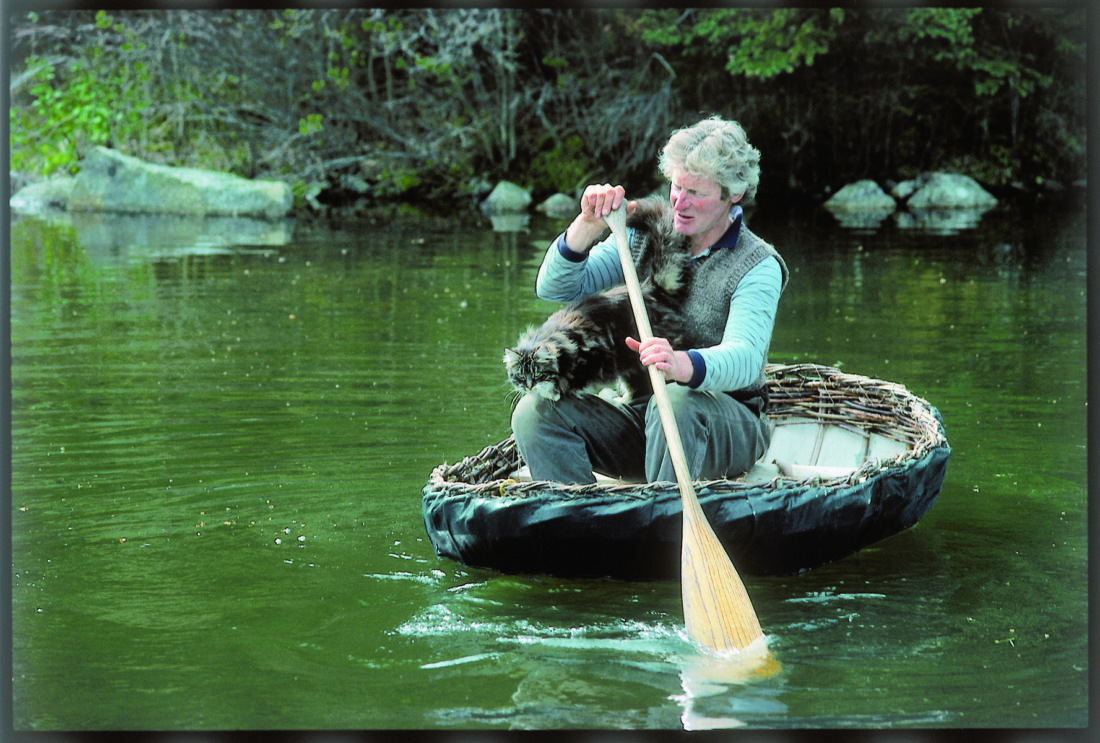 NOTE: you might also like to check out the following posts about St Brendan
NOTE: you might also like to check out the following posts about St Brendan
St Brendan the Navigator by Brenda Griffin Warren
Pilgrimage and St Brendan by Derek Olsen
 Looking for hospitality inspiration? We have an entire resource page dedicated to hospitality. Find recipes and reflections on numerous hospitality topics, including Celtic hospitality, prayers, and liturgies. Click on Hospitality for more!
Looking for hospitality inspiration? We have an entire resource page dedicated to hospitality. Find recipes and reflections on numerous hospitality topics, including Celtic hospitality, prayers, and liturgies. Click on Hospitality for more!
The Door is still Open
Propped Open
Cross the threshold into a thinplace
Into Peace
and Rest
and Joy.
Into Wonder
Into Beauty
Into Creation and Creativity
The Door is Open!
Propped Open!
Are you Ready to go through it?
Are you Willing?
It just takes One Step at a Time!
Walk forward and Believe
Walk forward and Receive…
.All that the Thinplace has to show you!
All that the Thinplace has to offer.
Leave your mat!
Rise and Walk.
Written on Iona in Oran’s Chapel May 2023 ©Lilly Lewin
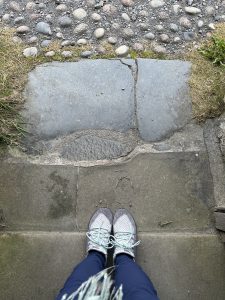
We all have thinplaces in our lives. Places where we have experienced the presence of God, the presence of the Holy. Like the mountains or the ocean or watching a beautiful sunrise or sunset. I believe we also have thinplaces in our regular lives. Things we do, or love that help us to experience the presence of God. We all need to allow ourselves, to give ourselves permission, to do more of those thinplace things! You might experience thinplace while working in the garden or baking bread. For some people it’s through music, playing it or singing it. For others, their thinplace it outdoors, running, hiking, even surfing! it might be in your creating something or in writing
Where do you feel God’s pleasure and God’s presence? That’s your thinplace!
Take some time to consider the places you’ve experienced God’s presence in the past and take time to be be grateful and thank Jesus for these experiences and places.
Take some time to consider what your regular life thinplaces might be….How can you experience more of the thinplace in the days, months ahead?
What would it take to put aside your fears and walk through the doorway, across the threshold into a new thinplace with Jesus in the months ahead? Ask Him to show you!
©lillylewin and freerangeworship.com
If you might be interested in Finding Your Thinplace , JOIN US FINDING YOUR THINPLACE Pilgrimage August 28-Sept.4th this summer. We are looking for a few more pilgrims to join us to discover the beauty and wonder of Iona! Find out more HERE!
by Christine Sine
I am back into doing daily awe and wonder walks, and it is wonderful. The delight of absorbing the beauty of spring and the joy of inhaling the fragrance of flowering trees is intoxicating. For the last couple of years I restricted my walks because of its impact on my asthma. Now I feel I have a new lease of life.
Last week I walked around Greenlake for the first time for months and drank in the beauty and the tranquility of the early morning scene. I often think that it must have been scenes like this that inspired my Celtic forebears to write poetry. It often has that impact on me, though I must confess I kind of cheat. I took a number of photos because I know that for me, these photos are a wonderful stimulus to meditation as they draw me back into the landscape that inspired my awe and wonder. Since then I have been mesmerized by this photo that I took during my walk and it inspired the prayer below.
Today I sat in silence for a few minutes reliving that scene and once more drinking in the beauty. I hope you too will pause in your day to absorb the beauty of God’s world around you and enter the serenity and peace that it beckons us into.
Still waters,
Reflections in the lake,
Serenity catches me by surprise.
I makes me pause,
And hold my breath,
When I catch glimpses,
Of this surpassing beauty.
A never to be forgotten moment.
An image imprinted on my mind.
God’s glory held in the stillness ,
Of a lake.
(c) Christine Sine 2023
As an Amazon Associate, I receive a small amount for purchases made through appropriate links.
Thank you for supporting Godspace in this way.
When referencing or quoting Godspace Light, please be sure to include the Author (Christine Sine unless otherwise noted), the Title of the article or resource, the Source link where appropriate, and ©Godspacelight.com. Thank you!

